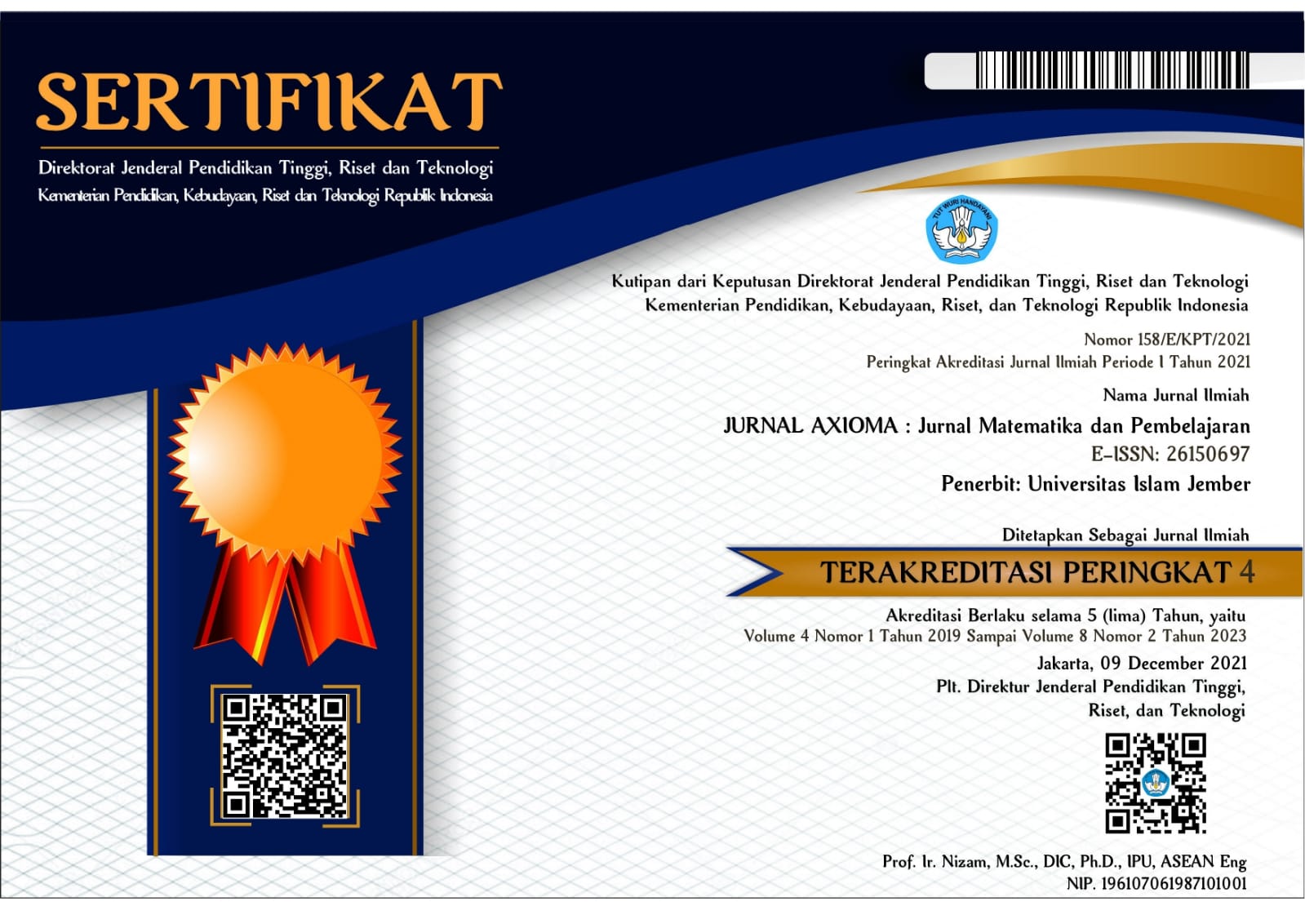The Development of 2P2M Learning Tools for Students with Cognitive Style Reviews in Differential Calculus Courses
Abstract
This research describes the development of learning tools with Mind Mapping Problem Posing for students with cognitive style of field dependent and fied independent. Learning tools made in the form of syllabus, RPP, and LKM. There are two types of LKM developed, LKM for students who have an independent field cognitive style and who have a cognitive field dependent style. Of course, before the learning takes place required a cognitive style test first for students. The cognitive style test to determine the type of cognitive style that each student has. This research is a development research with the development model used is Thiagarajan development model known as Four-D Models (Model 4D). After analyzed, the learning tools can be applied in the learning in the classroom.
Keywords: problem posing, mind mapping, cognitive style, learning tool, calculusReferences
Brinkmann, A. 2008. Investigating the Use of Concept Mapping as Tools in Mathematics Education. Germany: University of Münster.
Buzan, T.2013. Buku Pintar Mind Map. Jakarta : Gramedia.
Cankoy, O. & Darbaz, S.2010. Effect Of A Problem Posing Based Problem Solving Instruction on Understanding Problem. Hacettepe Üniversitesi E?itim Fakültesi Dergisi (H. U. Journal of Education), 38:(hlm. 11-24).
Chandra, F. 2014. Pengaruh Pembelajaran Problem Posing Berbantuan Mind Mapping terhadap Daya Matematis Siswa Ditinjau dari Gaya Kognitif Siswa. Tesis: Universitas Negeri Malang.
Chiou, C.2008. The Effect of Concept Mapping on Students’ Learning Achievements and Interests. Innovations in Education and Teaching International, Vol. 45, No. 4:(hlm 375–387).
Desyanti, F. & Susanah.2010.Penerapan Metode Pembelajaran Mind Mapping pada Materi Statistika. Jurnal MATHEdunesa,Vol. 2 No. 1 (2013) : (hlm. 1-7)
Herawati, O.; Siroj, R.; Basir, D.2010. Pengaruh Pembelajaran Problem Posing terhadap Kemampuan Pemahaman Konsep Matematika Siswa. Jurnal Pendidikan Matematika, Vol 4. No.1: (hlm.70-80)
Hidayat, Badi H. 2013. Analisis Kesalahan Siswa Dalam Menyelesaikan Soal Pada Materi Ruang Dimensi Tiga Ditinjau Dari Gaya Kognitif Siswa. Jurnal Pendidikan Matematika Solusi Vol.1 No.1, Hal 39-46.
Hidayat, R.; Sugiarto, B.; Pramesti, G. 2013. Analisis Kesalahan Siswa dalam Menyelesaikan Soal pada Materi Ruang Dimensi Tiga Ditinjau dari Gaya Kognitif Siswa. Jurnal Pendidikan Matematika Solusi, Vol.1 No.1: (hlm.39-46).
Kojima, K.; Miwa, K. & Matsui, T.2009. Study on Support of Learning from Examples in Problem Posing as a Production Task. Proceedings of the 17th International Conference on Computers in Education [CDROM].Hong Kong: Asia-Pacific Society for Computers in Education.
Permana, Y. & Sumarmo, U. 2007. Mengembangkan Kemampuan Penalaran dan Koneksi Matematik Siswa SMA Melalui Pembelajaran Berbasis Masalah. Jurnal EDUCATIONIST, Vol. I No. 2: (hlm.116-123).
Rahayu, R.; Suyitno, A.& Sugiharti, E. 2012. Keefektifan Pembelajaran Kooperatif Model Mind Mapping Berbantuan Cd Pembelajaran terhadap Hasil Belajar. Unnes Journal of Mathematics Education 1 (1): (hlm.45-51). (http://journal.unnes.ac.id/sju/index.php/ujme). Diakses tanggal 6 Desember 2013.
Reta, K. 2012. Pengaruh Model Pembelajaran Berbasis Masalah terhadap Keterampilan Berpikirkritis Ditinjau dari Gaya Kognitif Siswa. Jurnal Penelitian Pascasarjana Undiksha, Vol. 2 No. 1(2012) : (hlm. 1-17).
Sudarman. 2011. Proses Berpikir Siswa Quitter Pada Sekolah Menengah Pertama Dalam Menyelesaikan Masalah Matematika. Jurnal Edumatica Vol. 01 No.2, Hal 15-24
Sumarmo, Utari & Permana, Yanto. 2007. Mengembangkan Kemampuan Penalaran dan Koneksi Matematik Siswa SMA Melalui Pembelajaran Berbasis Masalah. Jurnal Educationist No.1 Vol.2
Sutame, K. 2011. Implementasi Pendekatan Problem Posing untuk Meningkatkan Kemampuan Penyelesaian Masalah, Berpikir Kritis serta Mengeliminir Kecemasan Matematika. Makalah dipresentasikan dalam Seminar Nasional Matematika dan Pendidikan Matematika FMIPA UNY.Prociding, ISBN : 978 – 979 – 16353 – 6 – 3
Downloads
Published
How to Cite
Issue
Section
License
Copyright (c) 2017 JURNAL AXIOMA : Jurnal Matematika dan Pembelajaran

This work is licensed under a Creative Commons Attribution 4.0 International License.


2.jpg)
.jpg)











